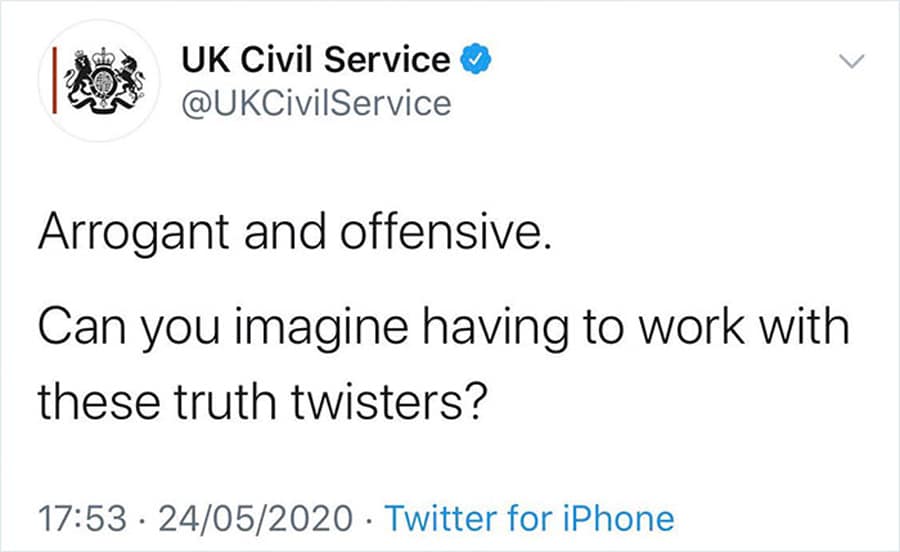Dominic Cummings, Boris Johnson’s senior advisor, broke UK lockdown rules. Is he going to resign?
Over the weekend, the story broke that Dominic Cummings, senior advisor to the Prime Minister and architect of the Vote Leave campaign, had broken government advice and travelled to his parents’ house in County Durham in order to isolate with his wife.
He claims that he did so in order to ensure his young child would have adequate care, in case both he and his wife became incapacitated from coronavirus; his wife was showing symptoms before they left London, although not as they left the city, and it was later disclosed that Cummings also came down with the virus.
The Prime Minister and his Cabinet quickly leapt to Cummings’ defence, saying that he was prioritising the safety of his child and, therefore, broke no rules or laws. However, no such specific exemption existed in the coronavirus legislation at the time; it was, according to the government, up to interpretation.
After a flurry of tweets and statements—“caring for your child is not a crime” was the buzz phrase parroted by senior Tories—the Sunday Mirror and Observer published allegations that Cummings had visited Barnard Castle, situated 30 miles from Durham, where he was supposed to be isolating. No evidence has been presented to refute these claims, with the government instead taking the unprecedented move to deny them outright. A police investigation now seems to be underway, which will either fully exonerate or completely humiliate the entire government.
Either way, the government’s chosen stance—that Cummings was doing what any good parent would do for their child—will inevitably cause difficulties in the next month, when there will be a big push to reopen schools, despite warnings from doctors and teaching unions alike. If Cummings can flout guidelines to protect his child, why can’t every parent?
At the time of writing, over twenty Tory MPs, numerous Anglican bishops from across the country and journalists from across the political spectrum have called on Cummings to resign, or for Johnson to fire him.
This could have been a non-story if Johnson had had the backbone to immediately dismiss his aide. After all, both government scientific advisor, Neil Ferguson, and Scotland’s chief medical officer, Dr Catherine Calderwood, resigned almost immediately after being found to have broken lockdown rules; and both did so without the threat of actively spreading the virus. Instead, the very integrity of the government has come under attack.
At a time when a lack of trust will cost lives, the Tories are playing with fire. Almost every tweet from official accounts (10 Downing Street or the Cabinet Office) is being relentlessly mocked. After Johnson’s Sunday press briefing, the Civil Service’s primary Twitter account posted a now-infamous tweet that was swiftly deleted but shall not be forgotten: “Arrogant and offensive. Can you imagine having to work with these truth twisters.”

People are saying that Cummings must stay because the Prime Minister relies on him to lead—but surely, if you rely so badly on appointed advisors, you are not fit to run a country during an unprecedented crisis. Similarly, others are claiming that Cummings is hanging on because he knows where the proverbial bodies are buried, which could make the coming weeks particularly fascinating.
The government is going as far as to purge social media accounts of old slogans, specifically those that could now be deemed damaging, such as: “If one person breaks the rules, we will all suffer,” and, “Breaking the rules is breaking the law.” Dominic Cummings has always believed that he is above the rule of law; perhaps now he will finally face the music.
Let the record show that this was the week Johnson went full-blown Trump: he has an Attorney General who prioritises political affiliation over the rule of law; he is prepared to gaslight the whole nation, spouting nonsensical hypocrisy, and when staunchly right-wing press have criticised his actions, his supporters have denounced this as left-wing propaganda.
This whole debacle has been heartbreaking. For the first time ever, I emailed my MP to express my outrage. Rarely, if ever, have I been so ashamed by the actions of my government. After Johnson’s Sunday briefing, I was practically shaking with rage—and I know I am far from being the only one. Cumming’s Monday statement did nothing to alleviate pressure; if anything, he dug himself deeper into a hole.
Cummings’ defence on Monday evening amounted to doing the best for his child by utilising loopholes most were unaware of, without being certain either he or his wife had coronavirus. He claims that he went back to work after his wife presented symptoms. If everyone were to accommodate such uncertainties into their approach to lockdown, things could be even worse—while it is worth noting that the UK nonetheless has the worst death toll in Europe.
The pique came as Cummings explained that his 30-mile (each way) trip to Barnard Castle was to “test his eyesight,” before making the 260-mile trip back to London. “On the point about eyesight, I’m finding I have to wear spectacles for the first time in years,” said Johnson, “so I’m inclined to think that’s very, very plausible.” Because of my own optical prescription, I am required to wear glasses or contact lenses whenever I drive; if I don’t, this is a simple and standard breach of vehicular law. The same, apparently, does not apply to senior advisors to the government.
What Cummings did must surely be illegal with or without lockdown restrictions. Moreover, he was happy to take his child on this peculiar trip, when he was unsure of his own ability to drive, bringing into question his central defence of “doing the best for his child.”
In trying to do the complete opposite, the UK government made it very clear that it is one set of rules for BoJo and his mates, and another set for the rest of us. As far as I can tell, this is indefensible, yet the government is happy to give it a go. What are they protecting? What is more vital than the lives of the public? Only time will tell.





